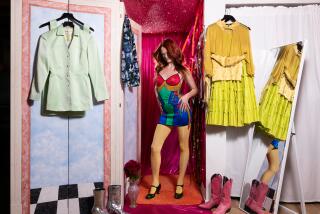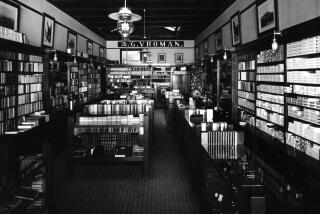Lillian Vernon Still the Head of Catalogue House : Entrepreneurs: She resolved the succession question by selling a large stake in the firm--and remaining in charge.
- Share via
Lillian Vernon Corp. is a classic story of entrepreneurship. Started by Chairwoman Lillian Vernon in 1951, when she was a 24-year-old housewife hoping to add $50 a week to the family budget, the firm today is a major direct-mail retailer with annual sales of $222 million.
Several times a year, more than 18 million American households find her unique catalogues in the mail--booklets stuffed with hundreds of low-priced household goods, personal items, novelty gifts, toys and knickknacks.
Vernon’s goods range from the practical (an acrylic stand for TV remote controls, $14.98) to the downright goofy (a grated-cheese shaker in the form of the Leaning Tower of Pisa, $9.98). As one wag once put it, Vernon sells the kind of stuff you didn’t realize you needed until you saw it in her catalogue.
The catalogues also include a photograph of a smiling Vernon in a gentle pose, although the 68-year-old German emigre is also known for her strong will and flashes of temper.
Her commitment to her business is unquestioned: After two divorces, the woman born Lillian Menasche legally changed her name a few years ago to Lillian Vernon. (The company has that name because it was founded in Mt. Vernon, N.Y.)
But now Vernon is facing a classic problem: How an entrepreneur should plan for her succession. Vernon’s solution is to sell most of the company--but stay in charge.
Two weeks ago, Lillian Vernon agreed to sell a majority stake to Freeman Spogli & Co., a Los Angeles-based investment firm, for $190 million. The deal was struck after the company--whose stock is now held about evenly among Vernon family members and public shareholders--put itself up for sale in March.
Yet the deal also calls for Vernon to remain chairwoman and chief executive, and she and her 38-year-old son, David Hochberg, a company vice president, will keep a 25% equity stake in the New Rochelle, N.Y.-based concern.
“This is the closest I’ve seen to someone getting their cake and eating it too,” said Kenneth Gassman, an analyst with the brokerage Davenport & Co. in Richmond, Va., who estimates that Vernon and her family will reap about $50 million from the sale.
Sources close to the deal said Vernon began thinking of selling the company two years ago when her other son, Fred Hochberg, 43, who was the company’s president and the heir apparent, abruptly quit.
“Once Fred left, the whole dynamic of what was once a family business changed,” one source said. “So, to plan for the future, she decided it was time to sell.”
David Hochberg confirmed that his brother’s departure prompted his mother and the company’s other directors to “plan for the future” of Lillian Vernon and pursue the sale, but he emphasized that his mother “loves the business and is committed to the business.” He declined to elaborate.
But John Roth, a general partner of Freeman Spogli, said keeping Vernon as chief executive was “a requirement” for his firm to do the deal.
Also, the 25% equity stake Vernon and her son retained enables them to keep sharing in their company’s growth. Her public stockholders would not get that chance, and some are angry about it.
The $19-a-share offer from Freeman Spogli, a firm co-founded by Los Angeles Mayor Richard Riordan in 1983, was 6% below Lillian Vernon’s market price on the American Stock Exchange at the time. That prompted three stockholders to rush into court the next day seeking to block the transaction on grounds that the price was too low. Lillian Vernon said the lawsuits had no merit. The stock closed Friday at $18.375 a share. Analysts said Lillian Vernon probably fetched the best price it could, because the catalogue business is struggling to maintain its growth. Lackluster consumer spending, fierce competition among catalogue houses and rising postal and paper costs are combining to limit all catalogue retailers’ sales gains.
Lillian Vernon is holding up nicely, though. In its fiscal year ended Feb. 25, sales rose 13% and its profit rose 7%, to $13.6 million--although earnings in the last quarter of the year fell 7% from a year earlier, thanks to the postage-rate increase that went into effect Jan. 1. The company also has little debt.
Vernon never envisioned an enterprise of that size when she started the firm in her kitchen. She was born in Leipzig, Germany, in 1927, but as Hitler came to power she and her parents fled to the Netherlands and then to New York City, where her father sold leather goods. After marriage to her first husband, Sam Hochberg, in 1949, Vernon took a $2,000 wedding gift, acquired some purses and belts from her father, monogrammed them, and ran a $500 ad in a magazine offering to sell the goods by mail: $2.99 for the purse, $1.99 for the belt. Within weeks she had sold $32,000 of the goods, and she started adding other items to her inventory. As the years rolled by, Vernon became her own top buyer, traveling the globe for several weeks each year in search of unique goods. Today, 80% of the company’s products are imported.
More to Read
Inside the business of entertainment
The Wide Shot brings you news, analysis and insights on everything from streaming wars to production — and what it all means for the future.
You may occasionally receive promotional content from the Los Angeles Times.











